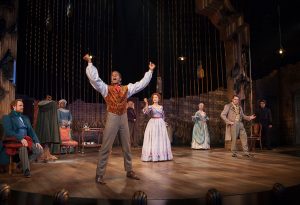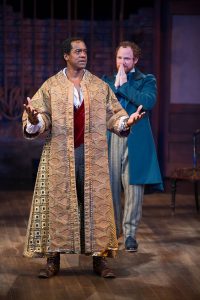Ira Aldridge: A Hero Onstage and Off for the Old Globe’s ‘Red Velvet’
For any celebration of the American actor Ira Aldridge (1807-1867), count me in. He’s long been one of my heroes, both for the reports of his celebrated Shakespearean artistry and for the sheer implausibility of his triumphant career: an African-American conquering the classic stages of Europe while his fellow native sons were still enslaved.
Red Velvet, Lolita Chakrabarti’s biographical drama now at the Old Globe Theatre, isn’t a great play but it is a sincere, well-researched and often moving homage to a forgotten titan.

Albert Jones as the American actor Ira Aldridge, center, with Old Globe Red Velvet cast members, left to right, Sean Dugan, Monique Gaffney, Mark Pinter, Allison Mack, Amelia Pedlow, John Lavelle and Michael Aurelio. Jim Cox Photo
The poignant reality of contemplating historical performers is that there can never be any true access to their art, only reports or illustrations. And these are at best subject to interpretation.
A powerful example of this fact, applicable to this play, is Samuel Taylor Coleridge’s comment that watching the English actor Edmund Kean was “…like reading Shakespeare by flashes of lightning.” Sounds awesome, until you read the context. What Coleridge seems to have meant was that Kean suffered from extremes of style, and that he was not “…gentleman enough to play Othello.”
So, while we have the scripts and the scores, we’ll never really known the sound of Shakespeare’s actors or Bach’s trumpeters, exactly how they did what we see written down. There are stirring paintings of stage scenes but they remain frozen in attitude. It would be well into the 20th Century before photography and recording was of real help. All else remains mere speculation.
Except for one element: The box office report.
Coleridge or no Coleridge, audiences loved Kean. And David Garrick and Edwin Booth and so forth. Theatre ruled in the 19th Century and the superstars did very well indeed.
Thus Ira Aldridge, very much a part of that crowd as a leading actor for three decades, stands secure in his successes (he even was knighted in Saxony) though the reports tended to be … mixed.
Like Othello, a part he played so often and to such acclaim, Aldridge was a black warrior in a white world. And that white world had its realities, including reviewers of theatrical performances who felt it necessary to point out that Africans could never declaim classical poetry properly… because their lips were too thick.
Such tiresome and inappropriate stereotypes receded, but they ruined Aldridge’s Covent Garden debut. And they warped his subsequent successes. Both sad results are dealt with in Chakrabarti’s play, which opens and closes in Poland, where the actor died in 1867, with the London debut displayed before and after.
The author has little to offer except speculation on how the conversations progressed. Aldridge has been hired as a replacement for the ailing Edmund Kean, much to the annoyance of Kean’s son and presumed heir. The new Othello must be introduced to the company, a rehearsal must be stumbled through and the performance suggested. Later, despite an enthusiastic audience, the sour reviews and the subsequent cancellation of further performances must be endured and the inevitable wrangling gotten through. (His Desdemona “…has bruises on her arms!”)
I’m not sure what else the author could have offered but I’m unsatisfied. And, sadly, I also feel that way about Albert Jones’ performance in the central role. What more did I expect? Jones has the grace, the intelligence, the conviction and the presence for the part, but the voice, which so rings in my fantasy, is muffled and hoarse. For this, if nothing else, I find Albert Jones a satisfactory, if not ideal, Ira Aldridge.
Stafford Arima has made a shrewd selection of compromises to bring the flavor of the 19th Century theatre to this production without laboring over the details. Thus for example, when the stage gaslamps and candles must be fired, the action is merely suggested.
Understandably, Jason Lyons has no magic to suggest the lighting so he designs for general atmosphere. Likewise, David Israel Reynoso’s costumes, completely accurate to my eye but bland without making that point. Both approaches are preferable to Jason Sherwood’s scenery, which looms with a certain mystery and majesty but fails to suggest the enormous reaches of Covent Gardens and, confusingly, seems to have suffered from some violent vandalism along the proscenium arch.
Arima’s basic approach is to help each actor to illustrate the period through poise, attitude and style of movement. The results are mixed.
Allison Mack is most effective as a reigning leading lady who must adjust her work as Desdemona to a very different Othello. She gets it all right: the disdain, the resistance, the stirring of interest and the professional pride in the results.
As Charles Kean, John Lavelle makes unfortunate choices. There is an old tradition that 19th Century actors played broad and bombastic (we’ll never know for sure, remember) but his sample of Iago is disastrous, a grotesque, simpering cartoon of petulance.
Michael Aurelio as a preening juvenile and Mark Pinter as a seen-it-all character man are quite effective but Amelia Pedlow misfires sadly as a one-note ingénue. (These three actors also play other incidental roles with admirable delineation.)
Historically, the manager of Covent Garden in 1833 was a Frenchman named Pierre Laporte. Sean Dugan plays him with stern resolve but the author has the character too burdened. There is a suggestion of a long relation between actor and manager which doesn’t gibe with the sketchy known facts. And when Dugan as Laporte must preach the virtues of patience and restraint, it is with an unexpected fervor suggesting extended frustration.
Monique Gaffney, as a black maid presiding wordlessly over the teapot for the lounging actors, is like a gun waved about but never fired. When there finally is a brief scene between her and Jones, nothing really happens. No insights. But Gaffney lurks with a dignity that enriches the furtive reactions she’s assigned.
So we’re left with a lot unregistered and unexplained. I’m still not sure where Aldridge got the chops to begin playing roles as a teenager, first in New York and then in the British provinces. And in Europe, I’m not clear whether he was considered a freak or a phenomenon.
But, in the final scene, when Albert Jones dons the King Lear costume and wig, after he has applied his whiteface makeup, I found a rush of renewed reverence for one of my true theatrical heroes.
(Continues on the Old Globe main stage at 7 p.m. Tuesdays, Wednesdays and Sundays; at 8 p.m. Thursdays-Saturdays; and at 2 p.m. Saturdays and Sundays through April 30, 2017.)

Welton Jones has been following entertainment and the arts around for years, writing about them. Thirty-five of those years were spent at the UNION-TRIBUNE, the last decade was with SANDIEGO.COM.



